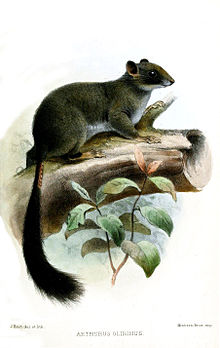Zenkerella is a genus of rodent, the only member of the family Zenkerellidae. It was formerly classified in Anomaluridae until phylogenetic studies made its distinctiveness clear.[2] While the Anomalurus of the family Anomaluridae has gliding membranes between its forelimb and hindlimb, the Zenkerella has no such adaptation.[3] It is estimated from fossil records that this divergence might have occurred in the middle of the Eocene.
| Zenkerella Temporal range: Early Miocene to recent[1]
| |
|---|---|

| |
| Scientific classification | |
| Domain: | Eukaryota |
| Kingdom: | Animalia |
| Phylum: | Chordata |
| Class: | Mammalia |
| Order: | Rodentia |
| Suborder: | Anomaluromorpha |
| Family: | Zenkerellidae Matschie, 1898 |
| Genus: | Zenkerella Matschie, 1898 |
| Species | |
There is a single extant, the Cameroon scaly-tail, and a single fossil representative. The fossil species Zenkerella wintoni is known from a single mandible from Songhor, Kenya dated to the Early Miocene.[4]
References
edit- ^ "Mindat.org". www.mindat.org. Retrieved 2021-06-13.
- ^ Fabre, Pierre-Henri; Tilak, Marie-Ka; Denys, Christiane; Gaubert, Philippe; Nicolas, Violaine; Douzery, Emmanuel J. P.; Marivaux, Laurent (2018). "Flightless scaly-tailed squirrels never learned how to fly: A reappraisal of Anomaluridae phylogeny". Zoologica Scripta. 47 (4): 404–417. doi:10.1111/zsc.12286. ISSN 1463-6409. S2CID 89754034.
- ^ Heritage, S.; Fernández, D.; Sallam, H. M.; Cronin, D. T.; Esara Echube, J. M.; Seiffert, E. R. (August 16, 2016). "Ancient phylogenetic divergence of the enigmatic African rodent Zenkerella and the origin of anomalurid gliding". PeerJ. 4: e2320. doi:10.7717/peerj.2320. PMC 4991859. PMID 27602286.
- ^ Werdelin, Lars; Sanders, William Joseph (2010). Cenozoic Mammals of Africa. University of California Press. p. 290. ISBN 9780520257214.